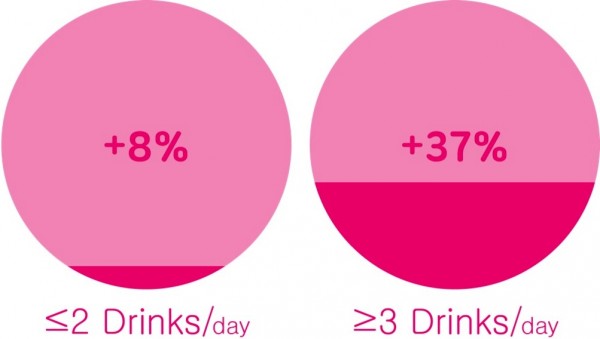The University of Victoria’s Centre for Addictions Research of B.C. (CARBC) recently published a study linking moderate drinking to breast cancer. The study shows that low-level drinkers, at less than two drinks per day, increase their risk for developing breast cancer by 8.5 per cent. The study is part of a broader look at the relationship between alcohol consumption and risk of contracting various diseases, cancers, and injuries. These include prostate cancer, heart disease, esophagus cancer, diabetes, and more.
Sixty relevant studies were gathered by CARBC Director Dr. Tim Stockwell and his team, who then controlled and removed any biases to see how the picture changes, according to Stockwell.
These biases are created when comparing a drinker to an abstainer. For instance, there is a difference in baseline health between those who have always abstained, and those who once drank heavily, but have since stopped. Not all of the studies examined controlled for the differences.
“It was kind of complicated to remove these biases. As we report, out of the 60 studies, only six were free from any of the biases,” he said. “About 40 of those 60 studies put former drinkers in the abstainers [group], so it was a very contaminated group of less healthy abstainers on average, than [it] would be otherwise.”
Stockwell found evidence linking women who drink less than one drink per week, or even less than once per month, to having a higher risk of contacting different diseases and cancers, including breast cancer, than abstainers. “If you include them in with the abstainers, that’s going to suppress the evidence risk for the moderate drinkers—it’s going to make them look good,” he said.
According to the Canadian Breast Cancer Foundation, approximately 5 000 Canadian women die from breast cancer each year, 5-10 per cent of those being attributed to alcohol consumption.
“The way people define drinkers is very different across studies. That can really affect our findings,” research associate Dr. Kara Thompson said.
The published studies give researchers advice on defining an abstainer, and how they should measure alcohol consumption. This information allows for more accurate data, and a clearer picture on determining the accurate alcohol-related risks for cancers and diseases, according to Thompson.
“I think in general, people are unaware that alcohol is linked to cancer at all,” she said. “Tobacco is so commonly known to be linked to cancer—it’s on packages, we’re constantly being reinforced that it is a carcinogen. Alcohol doesn’t have that same connotation. It is a carcinogen and does cause cancer, but no one knows about it.”
“This is such a distant thing, when you’re 19 or 20,” Stockwell said. Most students and individuals at a younger age are more concerned about immediate risks, such as overdosing or making a fool of themselves, according to Stockwell.
“We all know alcohol is brilliant in certain ways at helping us cope in certain short term potentially stressful situations—there’s no doubt about it,” he said. “There’s a reason we all like it so much, and it makes us feel good. But unfortunately, there are these other consequences [to consider].”









